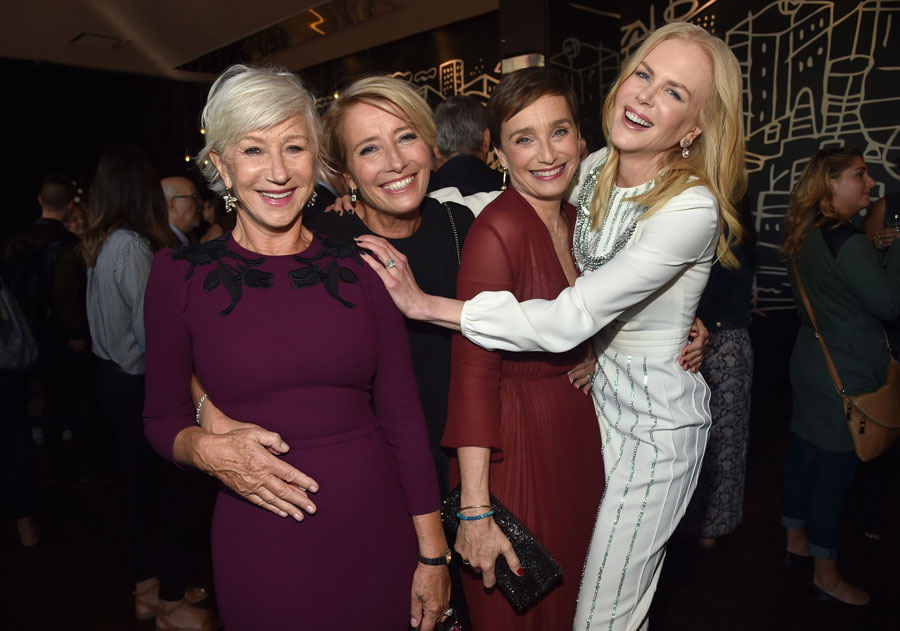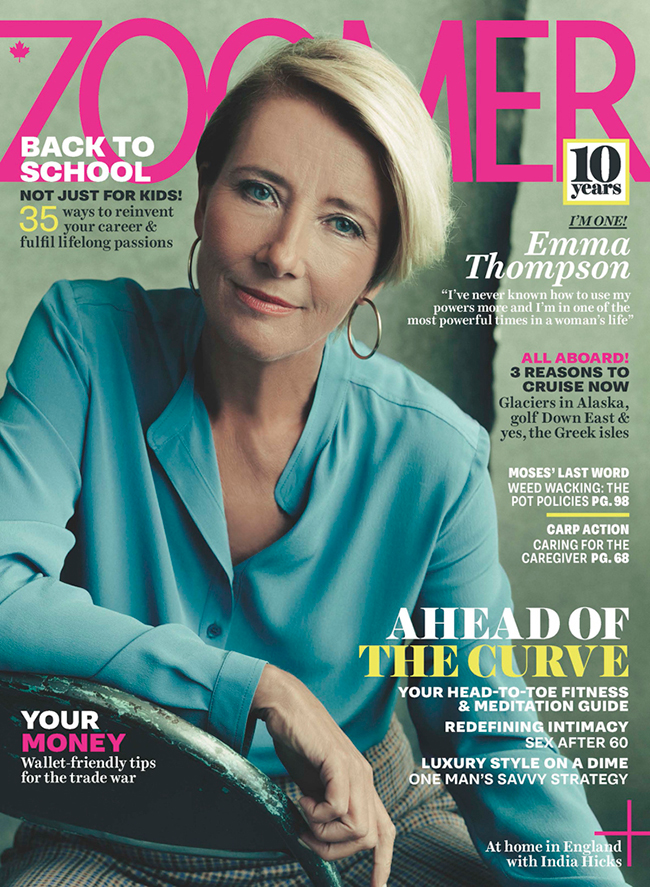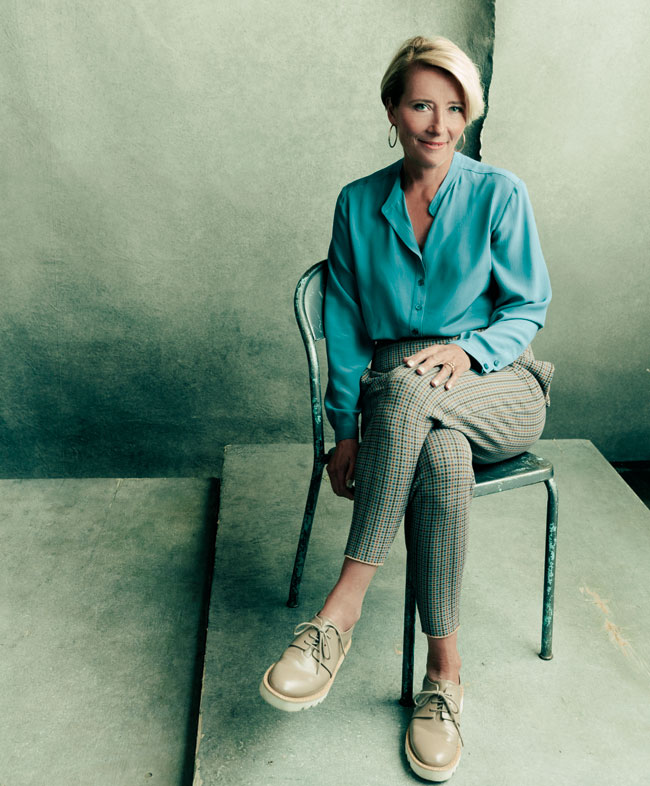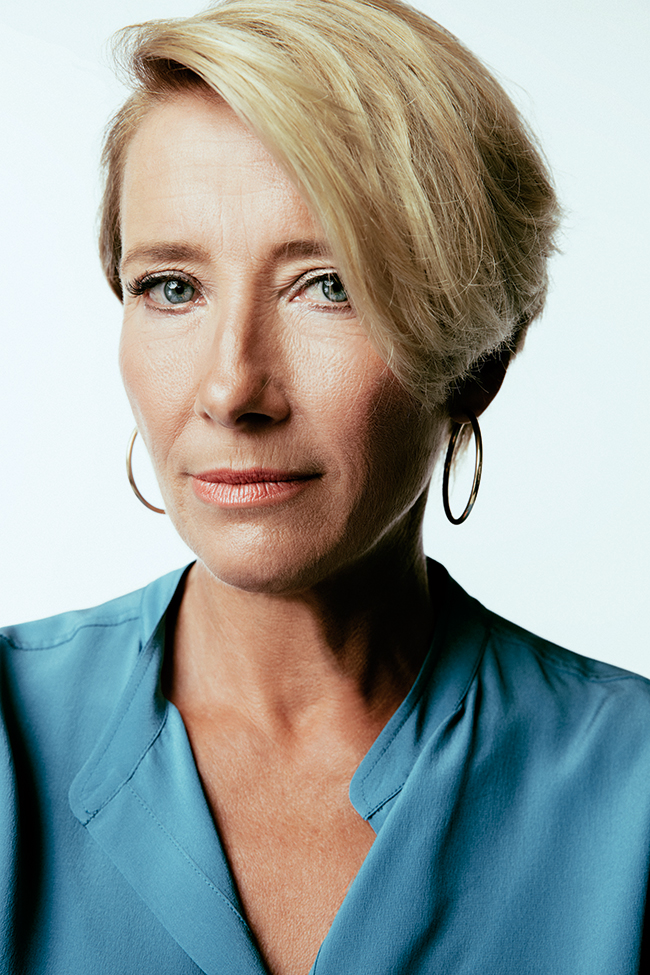The Importance of Being Emma (Thompson)

Oscar-winning British actor and screenwriter Dame Emma Thompson, who turns 61 this week, chats with us about family, feminism, aging and the joy of being alive. Photo: Austin Hargrave/August via Getty Images.
In celebration of Dame Emma Thompson’s 61st birthday, (April, 15) we take a look back at our 2018 cover story with the Oscar-winning British actor and screenwriter, where she chats with us about family, feminism, aging and the joy of being alive.
There is a picture taken at the height of the 2017 Toronto International Film Festival, in which I want to live. In it, Helen Mirren, Emma Thompson, Kristen Scott Thomas and Nicole Kidman beam at the camera, arms around each other. It’s clear that Thompson is the instigator — her nature is mischievous brilliance — and it’s also clear that there could be no better conversation happening in Canada or maybe the world at that moment.

Of course, any conversation with Thompson, 59, is the best conversation you will ever have. I first met her in 1990, when she and Kenneth Branagh, her then-husband, were living in a Hollywood Hills aerie, working on their film Dead Again. She was doing three things at once: taking off her makeup from a photo shoot (which felt like a metaphor — the longer we talked, the more herself she became); popping up to stir a huge pot of stock she had bubbling on the stove (“Hello, you lovely,” she said to the stock); and uttering streams of the funniest, frankest and most interesting sentences anyone had ever said to me.
“She’s just so luminously intelligent,” Richard Eyre, the director of Thompson’s latest film, The Children Act, says. “An intelligence that she doesn’t show off — it’s just there. She’s also hugely sympathetic. You believe her.”
More than that, you believe in her. In every role she’s ever played, from The Remains of the Day to Love, Actually and the Harry Potter films, Thompson radiates honesty, humaneness and connection. She conducts her life that way, too. She lives in West Hampstead, London and Dunoon, Scotland, with her husband, the actor Greg Wise (they met during the filming of Sense and Sensibility and married in 2003); their daughter, Gaia, 19; and their son Tindyebwa, a former child soldier from Rwanda whom Thompson first met at a Refugee Council event. She’s an atheist, a liberal, a “card-carrying, virulent feminist” and an activist for human rights and the environment.
She is also hilarious, an excellent storyteller, the naughtier the story the better. The Children Act, which is based on Ian McEwan’s novel, is a tough film: Thompson plays Fiona, a British High Court judge who has to rule on the complex case of a minor’s right to die, while her own life is falling apart. And taxi scenes are tough to shoot because the actors are crammed in with the camera and sound equipment. But while shooting a taxi ride in The Children Act, Thompson slayed the cast and crew with a classic British thespian story, the kind actors live to trade: Julie Andrews, dewy fresh at 18 in My Fair Lady, approaches Rex Harrison, notoriously unpleasant. “I wonder, Rex, could I possibly introduce you to my parents after the show?” Andrews asks.
“Why on earth do you think I want to meet your c*nting parents?” Harrison replies. “Emma’s delivery was marvellous,” Eyre says.

I’ve interviewed Thompson numerous times over the years, and — not unlike her lovely stock — she gets warmer, richer and more delicious with every passing moment. Our most recent encounter was at TIFF 2017, where she premiered The Children Act (it finally opens in Canada September 2018). I told her she looked terrific. She replied, “Because I’m literally covered in makeup — slapped up to the eyeballs in it.”
Here are highlights from that conversation.
JS: What are you glad you know now?
ET I love this time of life. [She drops her voice dramatically.] I love it. I keep wandering into mates my age, and we’re just clutching each other going, “This is nice, isn’t it?” I’m still alive, and grateful for that every f**king day. I’m healthy [she knocks wood]. I have wisdom. I have the means to make what I’ve learned productive. I’m very productive. And I’m happy. I’ve never known how to use my powers more and I’m in one of the most powerful times in a woman’s life.
I can get up and speak in public without worrying about it, without thinking, “Do I know how to make my point?” I have considered certain themes for so many years, that I’m able to defend the things I think need defending; I’m able to make choices about what I do with my time so healthily; and I feel I have access to a mental health that I didn’t have access to before. That’s very comforting and soothing. I’m on very good terms with myself. Extremely good terms. That’s a great place to be.
JS: Was that hard getting to? What did you have to get over?
ET: Oh, boy. Oh, was it! Being young, being female. Just being born into a female body — that’s enough to give you pause, isn’t it?
JS: My friends and I joke that we’re finally free of our estrogen poisoning.
ET: Yes! Men have testosterone poisoning, and they have it for the rest of their lives, poor souls. [She sucks in her cheeks to deliver her next sentence.] Meryl thinks we should put estrogen into the drinking water, to mitigate the testosterone.
JS: Meryl. Streep?
ET [Nods in an exaggerated, mic-drop way.]
JS: Who else are you glad you know now?
ET: All my oldest friends, people I’ve known for nearly 50 years. The richness of old friendships is a glory, much to be enjoyed.

JS: How do you like being the mother to adults?
ET: My kids are so interesting! My son is working with the United Nations Human Rights Commission; he was just back for a week from his job in Iraq, and we had a wild, fascinating time discussing what he’s been doing. He’s working with displaced people coming out of Mosul. Which has been pretty rough. My daughter is studying amazing stuff. Talking to them is so great. Boy, am I glad I know them.
JS: What’s your idea of a perfect day?
ET: Waking up in Scotland. The sun is shining. I hard-boil some eggs, get out my little rucksack and stick in an egg, a packet of crisps, some fruit and a bottle of water, and I head off with any member of my family who happens to be around, walk up a hill and look at the view. Be on my own with the wind. I’m a little bit tired when I get back, so I lie in the hammock, nod off for half an hour. Then I have a cup of tea with mum [the actress Phyllida Law], talk about the news. Then I head off to the kitchen, and cook something lovely, maybe a risotto, something aromatic with herbs. At six, I go up to the bar, which my husband built when the smoking ban came in, and have a drink with the family. Then at half past six, I go down, finish off dinner, and they all come down and eat.

JS: Your husband built a bar in your house?
ET: In Scotland, in one of the barns. And he doesn’t even smoke anymore. Well, hilariously, he smokes a pipe. I caught him wearing socks and sandals the other day. He’s not going to forget about that in a hurry.
JS: What do you like about marriage now?
ET: That all our corners have been rubbed off, and we just laugh like hyenas most of the time. It’s heaven. We get hysterical sometimes, and our children get quite cross. We’re like kids. Of course, you have to be able to forgive, to let things go. Because we all make mistakes. Don’t carry it around. That thing of saying, “You always do that” or “You’ve always done that” — that’s death to any relationship.
JS: What made you say yes to The Children Act?
ET: Everything about it was fascinating to me. Fiona is doing a job that’s completely absorbing, that takes so much from her. I mean, all women need to be better than men at what they do. I don’t care what men say about that — it’s true. In the course of my research, I became friends with two family court judges, and my admiration for these women – they have families, they work hours you cannot imagine, their brains are so extraordinary. And they balance that with their capacity for compassion, common sense, understanding — things that sometimes are not readily available to the law as it stands. And the broader story is about a border in the human landscape between religion and a secular institution, the law, and how quarrelsome that border can be. It’s so timely.
JS: How did you cope, playing such a heavy subject?
ET: I did light a lot of scented candles. I play the piano in the film, so I had a piano in my dressing room. That was really helpful. When things got emotional, I would go to my trailer and practise.
JS: You’re writing a musical version of Nanny McPhee for the theatre and a screenplay for a romantic comedy-drama. You also played Goneril in a telefilm of King Lear with Tony Hopkins. What did you learn from her?
ET: She’s a piece of work. I really want to know, how were those girls brought up? They were shat on from a very early age. Lear is a dreadful old bastard. I look at those girls and think, “Yeah, he really messed you up, didn’t he?”
I’ll tell you what I’ve come to understand about myself — like a lot of women growing up in the 1970s, some of us swallowed the patriarchy whole. You think that within that system, you can shift it and change it. I now understand that’s not possible. It’s a system that needs to be shifted. Because it’s not working. It’s not serving us. Because it’s so one-sided and lopsided and overdeveloped in some directions, many of which are fantastically unhealthy. I now realize it’s not for me to try to make my way in a man’s world. It’s for the men to come into our world and say, “How do we do this? Can you help us?” It’s time that they come and ask us.
JS: Who else has caught your eye lately?
ET: I saw a Tasmanian comic in Edinburgh, Hannah Gadsby. [Her one-hour special, Nanette, is now on Netflix.] Her show is so fresh and so brave, speaking the truth about what it is to be female. It isn’t agitprop, it isn’t dogma. It was just the f**king truth, and I’d not heard it! I was so excited and inspired by it.
JS: How do you keep yourself optimistic? Are there things you have to tune out? Or do you force yourself to pay attention?
ET: I’m not on any social media. But I’m active. I recently did a Greenpeace photo in a wind farm to announce that wind turbines now cost half as much as they used to, and this is a fantastic step forward. I feel there’s a real movement happening, people are coming together from all sorts of silos, joining up. I feel very hopeful, in that sense. Whether we make it or not, that’s another question, because the climate change issue is so devastatingly obvious to all of us now, except to people who still are bamboozled by the fossil fuel industry. They just can’t see that wind power, which is clean and cheap, is also something that no one will ever fight a war over.
JS: What other advice would you impart to the world, if you could?
ET: I would say at the moment, because it’s a dark time, you need to connect. Make a connection. Do that now. Find out where people are mobilizing and resisting the dark stuff. It’s no good holding your hands up and going, “Isn’t it awful?” Be active. Do something. You feel better immediately. Random acts of kindness, also. Get connected and do one random act of kindness a day, and you’ll be happy.
JS: Last question. How do you deal with aging?
ET: I think you have to acknowledge what’s changing, what you’re losing and lean into it. You have to say, “Oh, god, I’m really sad about the fact that my legs look like this now.” Generally speaking, I’m not a mirror girl, so I don’t think about that too often. Although I did get into a yoga position the other day that was so horrific. Anyway. I think acknowledging all sorts of rage or frustration or fear about getting older is massively important. It’s no good wandering around going, “You’re as old as you feel” or “Age is just a number.” No! Getting older is a real thing. Your body changing is a real thing. Be honest with yourself: What do you really feel about it? Then ask, “So how do I accommodate that in my daily life?” because you’re as young as you’re ever going to be. Start with “I’m alive,” and that’s a fantastic thing because I could easily be dead. Easily. My father died at 52. I’m really grateful to be alive. I’m really, really grateful to be alive. And I find from that, all else follows.
A version of this article appeared in the Sept. 2018 issue with the headline “The Importance of Being Emma,” p. 36.
RELATED:
Emma Thompson Talks Turning 60 And Still Searching for Her Real Life Roles
What a Dame! Emma Thompson Wears Sneakers to Buckingham Palace